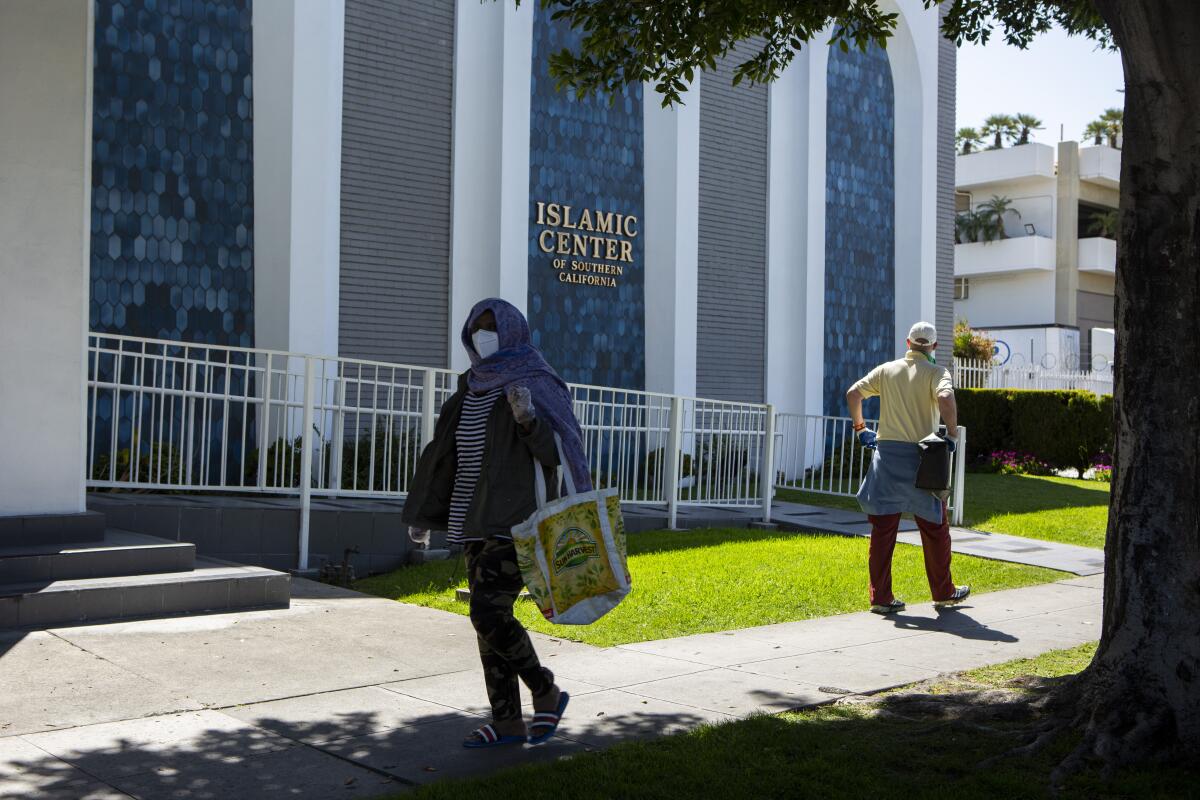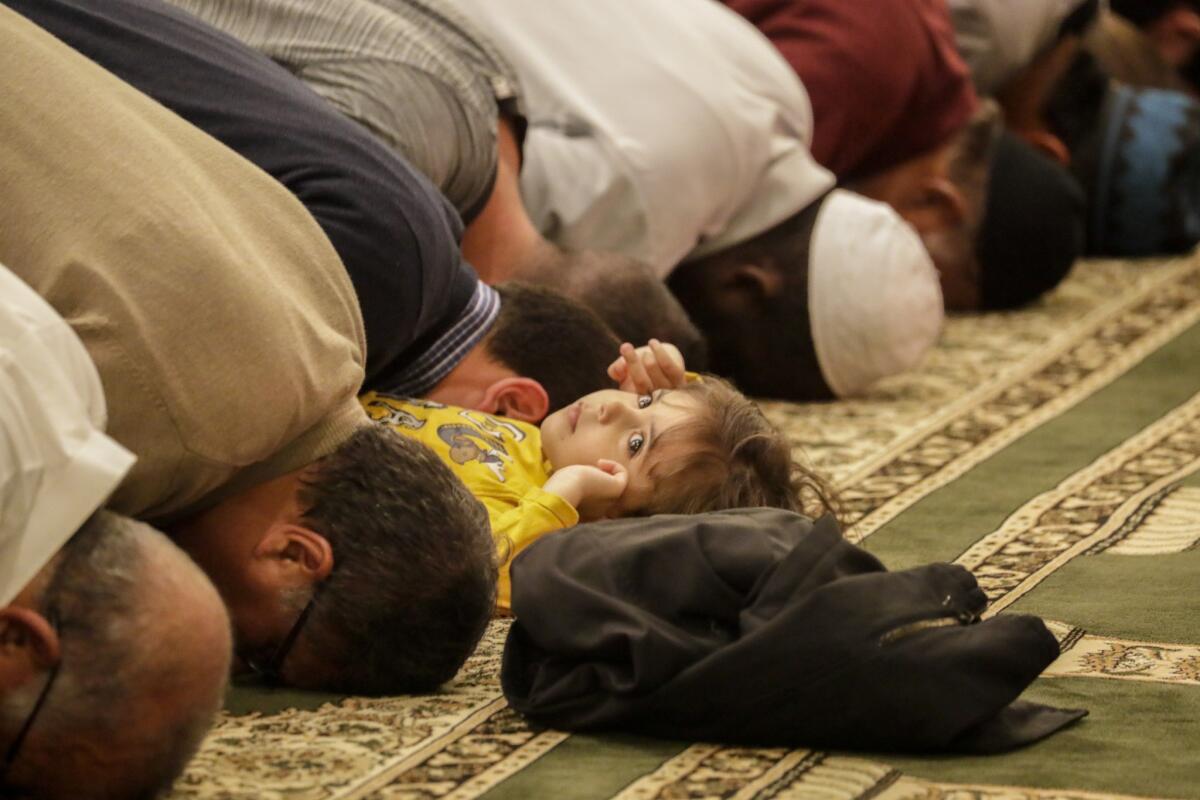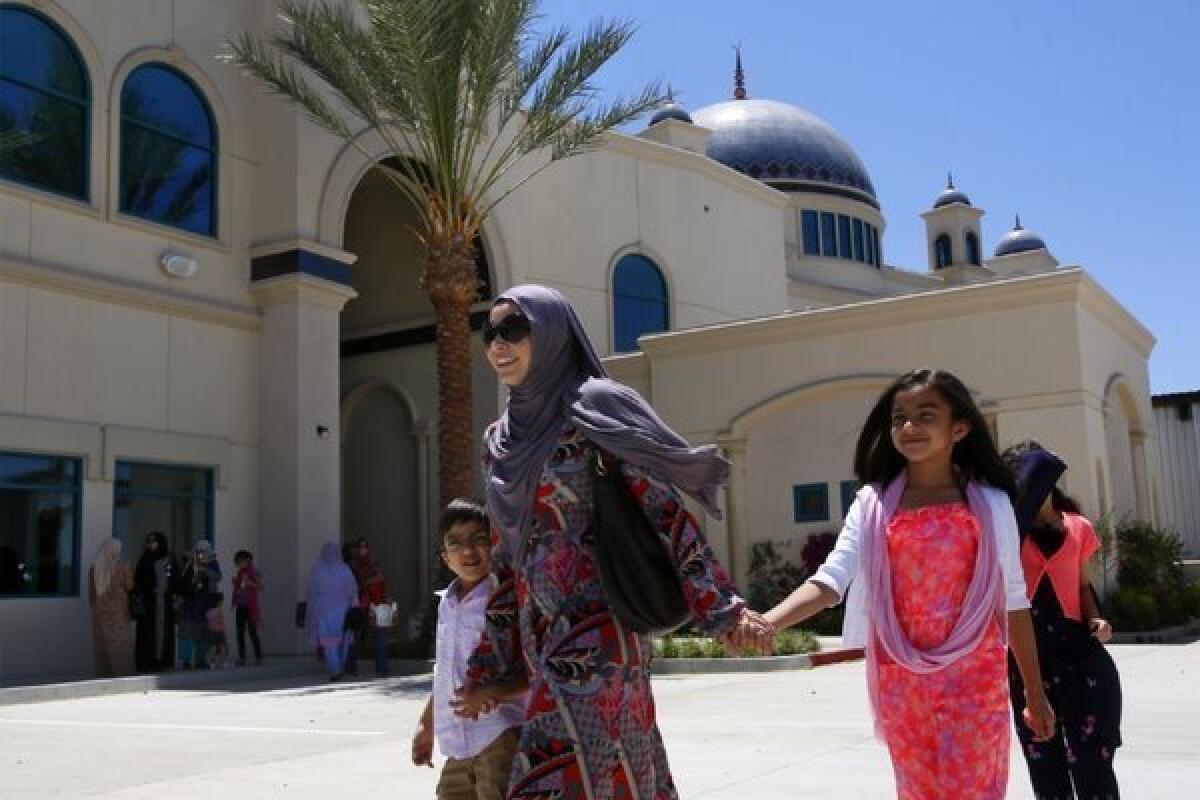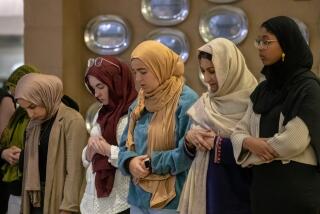Mosques raise a big part of their budget during Ramadan. Under coronavirus quarantine, key funding is at risk

- Share via
Last year, on the 27th night of Ramadan, the faithful at the Islamic Center of Hawthorne pulled up to the mosque in droves to celebrate one of the holiest nights on the Islamic calendar.
After they’d recited sunset prayers and begun their feast of meats, rice and rose milk, families dropped cash in donation boxes and wrote checks to the mosque as part of charity traditionally given during this season of spiritual introspection and elevated devotion.
Mosques around the country typically raise between 25% to 30% of their annual revenue through donations from congregants during the holy month, religious leaders say. For some communities, that can mean as much as $100,000, much of that concentrated in the final 10 days.
But this year, amid the coronavirus outbreak, those key funds are at risk. Some mosques and Islamic centers, already hit with a decline in donations throughout March and April, have let staff go or cut their hours; others have negotiated lower utility bills or canceled janitorial services as funds dry up. The Islamic Center of Hawthorne said that it expects to see as much as a 70% drop in Ramadan donations this year.
“It’s obviously a devastating time for everybody — all faiths, all cultures,” said Bilal Zaheen, outreach director at the mosque. “There had to be cuts from the mosque’s utility expenses. Personnel left of their own accord because they didn’t want to put the mosque under pressure.”
Some leaders worry that cuts at mosques could continue as communities lose a large chunk of their income this Ramadan — because there will be no physical gatherings to inspire donations and also because worshipers have been hit hard by the economic downturn and may not have as much disposable income to share.
The outlook has become so dire that Muslim communities throughout the United States have banded together to launch a national crowdfunding campaign aimed at donating funds to mosques. The “Caring for Our Own” campaign, spearheaded by four prominent imams, was designed to provide small, one-time grants ranging from $5,000 to $10,000 to mosques in need. The fund has raised more than $180,000.
“A lot of people have been furloughed or let go, or have seen a reduced salary,” said Muhi Khwaja, co-founder of the American Muslim Community Foundation, a nonprofit organization that partnered with LaunchGood to collect the funds. “This is, hopefully, a stopgap measure.”
As soon as officials mandated stay-at-home orders in various states, Khwaja said, he and other organizers knew that mosques would have to close their doors. Many mosques rely on Friday prayer collection bins, he added, and stopped receiving that funding in early March.
“On top of that, the mosques receive an influx in participants during Ramadan every day,” he said. “We anticipated that a lot of mosques would be in this scenario.”

Congregants often turn to mosques and other houses of worship in times of crisis. But during economic downturns, those institutions can be hit just as hard — if not harder — than the faithful.
“Congregations are microcosms of the world around them. They are not insulated from them,” said Brie Loskota, executive director of the Center for Religion and Civic Culture at USC. “Faith institutions sometimes get a double or triple impact because their leadership is impacted, the congregation is impacted ... that compounds to create a greater crisis.”
Loskota said that every mosque she knows is trying to figure out its next steps.
Zaheen, of the Islamic center in Hawthorne, said he doesn’t know where any future cuts would come from.
“We have full-time religious scholars. We wouldn’t touch their salaries,” he said. “They’re vital to the community’s function even from an online perspective. I think this is really rock bottom for us.”

At the Islamic Society of West Valley in Canoga Park, leadership has been forced to cut the staff’s pay in half. Shaykh Suhail Hasan Mulla, the mosque’s resident scholar, hopes to restore full salaries soon.
“Since we don’t have the programs to the same extent, the donations are not as forthcoming,” he said. “There also are fee-based services that we aren’t able to do.”
Ramadan, he said, is the time congregants gather most.
“We probably get about half of our annual donations during that one month,” he said. “You can imagine how that fans out for the rest of the year in terms of impact.”
Mulla plans to ask the board of directors to apply for LaunchGood donation funds.
For now, he said, the Islamic Society is holding Ramadan services on Zoom that include the recitation of the Quran and spiritual reflections.
“We don’t know how long this is going to last and what the financial impact is on the short-term and the long-term,” he said. “What are people’s savings habits and expendable wealth going to look like after all of this? What is this going to mean to attendance at the mosque?”
The inability to meet in person has also affected some mosques’ sense of community, said Omar Ricci, spokesman for the Islamic Center of Southern California. The Islamic center has been pushed to devise more creative means of connecting as a result, he said.
“It has a depressing impact, and we see that in some of the community members and what they are saying,” Ricci said. “We created a good, old-fashioned phone tree to reach out to elderly members of community.”
The center, he said, applied for the federal Paycheck Protection Program, but those funds were exhausted before they could obtain any.
Last year, a pre-Ramadan dinner raised nearly one-tenth of the mosque’s budget in one night, Ricci said. As much as one-third of the budget is raised during Ramadan overall.
This month, the mosque plans to continue its online programming and wait to see how this Ramadan compares to previous seasons.
“Financially, it’s been a hit,” he said. “But one of the ideas we have in our community is that better days are ahead. Don’t let this get you too much into the doldrums. Have faith that this is going to pass and that we will come out of it.”
More to Read
Sign up for Essential California
The most important California stories and recommendations in your inbox every morning.
You may occasionally receive promotional content from the Los Angeles Times.














